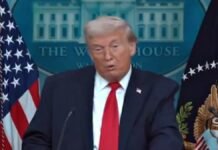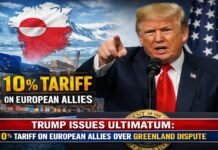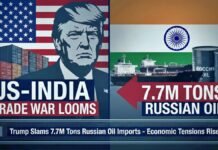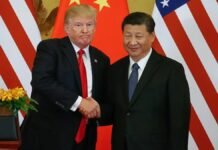
Key Points
- U.S. President Donald Trump defended his sweeping tariffs, calling them “medicine” to fix trade imbalances, despite global market turmoil.
- Stock markets worldwide plunged, with Asian indices like Nikkei and Hang Seng dropping over 7%, while Wall Street braced for further losses.
- Nearly $6 trillion in market value has been erased globally, sparking fears of a potential recession.
- Trump remains firm on his tariff strategy but expressed willingness to negotiate if trade deficits are addressed.
Washington D.C.: Global financial markets are in freefall following U.S. President Donald Trump’s announcement of extensive tariffs on imports from multiple countries. The tariffs, introduced on April 2, include a 34% duty on Chinese goods, 26% on Indian imports, and 20% on European Union products. The resulting market panic has wiped out nearly $6 trillion in value over the past week, with fears of a global recession mounting.
Trump Defends Tariffs Amid Market Turmoil
Speaking aboard Air Force One on Sunday, Trump defended his actions, likening the tariffs to “medicine” necessary to correct trade imbalances. “Sometimes you have to take medicine to fix something,” he said, adding that the U.S. has been treated unfairly by other nations for years due to “stupid leadership.”
Trump criticized previous administrations for allowing jobs and industries to move overseas and vowed not to back down until trade deficits are resolved. “We will not sustain deficits with your country,” he stated firmly. However, he hinted at being open to negotiations if other nations address their trade surpluses with the U.S.
Global Markets Plunge
The tariffs have sent shockwaves through global markets:
- Asia: Japan’s Nikkei 225 dropped 7.8%, South Korea’s Kospi fell 4.6%, and Hong Kong’s Hang Seng Index plummeted by 9%.
- U.S.: Futures for the S&P 500 and Nasdaq indicated further losses after last week’s historic declines, with Wall Street bracing for another “Black Monday.”
- Europe: Germany’s DAX fell by 5%, while other European indices also saw significant drops.
- Commodities: Oil prices fell below $60 per barrel, their lowest since 2021, while gold surged as investors sought safe-haven assets.
Recession Fears Grow
Economists are warning of a potential global recession as the tariffs disrupt supply chains and increase costs for businesses and consumers. JPMorgan has raised the likelihood of a U.S. recession to 60%, while analysts predict prolonged economic uncertainty if the tariffs remain in place.
Trump Engages World Leaders
Over the weekend, Trump claimed to have spoken with leaders from Europe and Asia who are “eager to make deals.” However, he emphasized that no agreements would be finalized until trade imbalances are corrected. China has already retaliated with a 34% tariff on all U.S. imports starting April 10, escalating fears of a full-blown trade war.
Market Outlook
As markets brace for further declines, investors are urging caution:
- The Federal Reserve has indicated it will maintain its current interest rate policy despite inflation concerns.
- Key sectors like technology and manufacturing are expected to bear the brunt of the economic fallout.
- Analysts warn that prolonged uncertainty could lead to deeper market corrections in the weeks ahead.
The ongoing tariff war has left global markets reeling, with no clear resolution in sight. As tensions escalate, all eyes are on whether world leaders can negotiate their way out of this economic crisis or if deeper market turmoil lies ahead.






















































